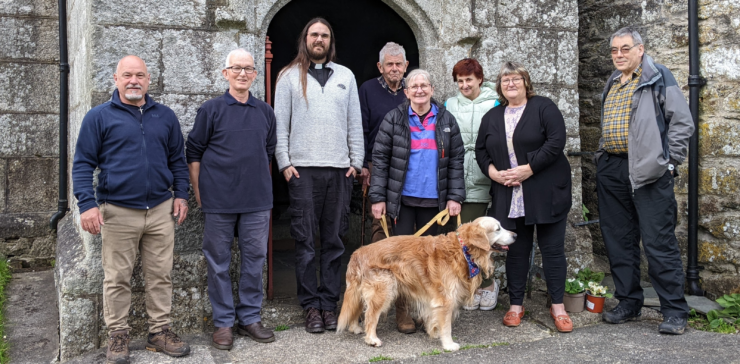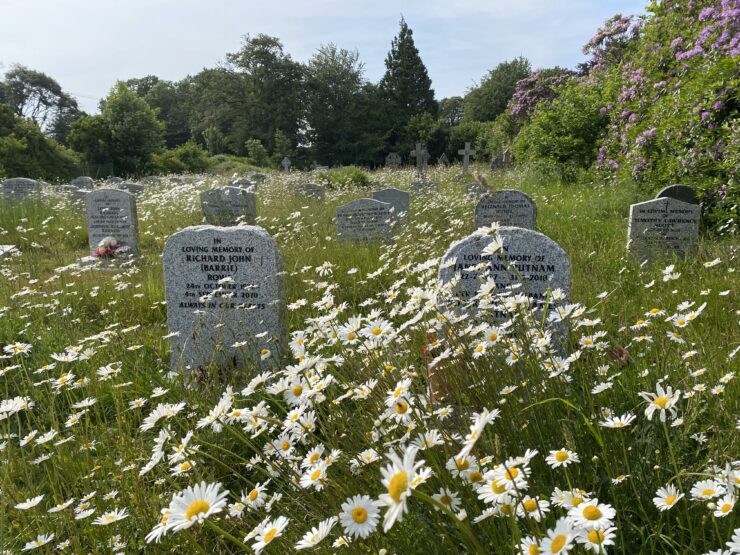Diocesan first: Two churches receive Eco Church Gold
Two churches in the Diocese of Truro have been awarded Gold Eco Church Awards, two of less than 50 nationally to receive the prestigious accolade.
St Mary’s Church in Bradoc was the 48th gold awarded in England and Wales and the 32nd Church of England church to be awarded. It, along with St Protus and St Hyacinth’s Church in Blisland which was also awarded on the same day, are the first two gold churches in the Diocese of Truro.
The Rt Revd Hugh Nelson, Bishop of St Germans, said: “Christians are called to take responsibility for cherishing God’s good creation, cutting carbon, and speaking up on behalf of those most affected by climate injustice. These gold awards show that churches in Cornwall are at the forefront of this crucial work. I could not be prouder of the people and communities of Bradoc and Blisland, and I look forward to more churches following in their footsteps.”
Eco Church launched in 2016 and there are now 3,000 churches across the country with Eco Awards ranging from Bronze to Gold. Gold is the most difficult to achieve.
St Protus and St Hyacinth’s Church, Blisland
On receiving gold, Blisland Church’s Creation Care Champion Ann Sutton said: “We are very pleased to have got the Gold Award. It has been very hard work, but we are extremely proud. The step up to the gold was a big one.”
Blisland Church began its journey to Eco Church gold status two years ago with the appointment of Ann Sutton as Creation Care Champion. A team was formed which included vicar Robin Thwaites, Gerry, Pat, Nick, Katie, and Robert.
Ann said: “The initial job after registering with Eco Church was to complete five surveys about Worship and Teaching, Buildings, Land, Global and Local Engagement and Lifestyle.”
It became apparent that while the church scored well in some categories more work was needed in others. With a wealth of advice and support, the team were inspired and as they had already taken several steps to make the church more sustainable they carried on.
Ann said: “We had a mowing plan that left the early spring wildflowers to grow but extended this to No Mow May and after seeing the beautiful sea of wild bluebells and oxeyes, left islands of uncut ground even after we cut the grass at the end of May.
“We made and installed bird boxes, bat boxes and a hedgehog box, made small stacks of wood and heaps of slate for insects and a large bug hotel plus a feeding station for birds in the winter. We measured and off set our carbon footprint, changed outside lights to solar and inside to low energy LEDs, twinned our village loo with one in Africa, and surveyed the flora and fauna in the churchyard. We installed compost bins and water butts and made a bog garden amongst numerous other things.”
Having decided from the beginning that any money raised to support what they wanted to do had to be done in a green way, the team registered the church as a fairtrade church and held coffee mornings, tabletop sales of donated goods, a second-hand book table near the church gate in summer and a table at Christmas with preloved Christmas trees and decorations. Thanks to the generosity of the community in both donating and buying the team had soon raised enough to fund not only what they wanted to do but to also contribute to various local and global environmental charities like Cornwall Wildlife Trust, the World Land Trust, IFAW, Prickle and Paws, Lend with Care (Climate Positive Grants) and the Rainforest Trust.
To promote what they have been doing, there is now a permanent display in the church exhibiting the flora and fauna surveys and pictures. A second display is also available in the village institute.
All of this went towards the ‘Gold’ achievement. Ann said: “We also had to provide a wealth of supporting evidence, have an hour-long telephone interview and then pass a three-hour inspection by the nice lady from Eco Church.”
The Blisland team were delighted to receive the gold award and have now been re-energised to carry on with the plans they have made for the future. Ann added: “We are helping set up a children’s area in the church, hoping to create a small mammal bank and plant more wildflowers as well as a juniper hedge in our new churchyard extension. Katie is working on a leaflet we can put in church as we get many visitors outside of services, we already have an information station to help people who want to be more sustainable, and plan to twin the churchyard through the Ripple Effect scheme.”
St Mary’s Church, Bradoc
Bradoc Church’s team were praised by Eco Church for being an ‘enthusiastic, passionate, knowledgeable, positive and active team’.
The work the team have done around the churchyard and graveyard and how they are managed for wildlife, including the mowing regime, and providing habitats and structures such as bird boxes, bug hotels, grass snake ‘houses’ was particularly highlighted. The congregation and community are enabled to engage with these areas by carrying out regular species surveys, taking part in creative outdoor worship and getting involved in future plans for the development of ‘no dig’ beds at one end of the graveyard.
There was more support for the church’s involvement with the local school is an exciting example of a partnership which has enabled the creation care message to be shared and multiplied. Through a link to the RE curriculum for Church Schools – ‘Understanding Christianity’ – the children have become involved with the church and engaged in many environmental activities. The passion and commitment of Eco Group members to both Creation Care and to the children of the school, has resulted in an incredible symbiotic relationship. The Head sits on the PCC and two Eco Group members are Foundation Governors. Open the Book; a weekly ‘Messy Church’ style after-school club, run by members of the Eco Group at the school, and the Junior Bell Ringing courses in the Church, are all used in different ways to share the Creation care message – using discussion, prayer, and activities.
Eco Church assessors were impressed by the long-term thought that had been given to carbon reduction in how the building is used and heating is provided. Very careful consideration has been given to offsetting through carbon sequestration by the on-site trees and wildflower areas.
Find out more about the Eco Church awards or Kernow Green Church Awards here






